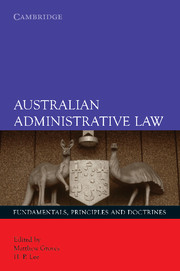Book contents
- Frontmatter
- Contents
- Foreword
- Preface
- About the contributors
- Table of cases
- Table of statutes
- 1 Australian administrative law: The constitutional and legal matrix
- 2 Administrative law in Australia: Themes and values
- 3 The public/private distinction in Australian administrative law
- 4 Australian administrative law: The human rights dimension
- 5 Administrative tribunals
- 6 Australian Ombudsman: A continual work in progress
- 7 Freedom of information
- 8 Delegated legislation
- 9 The concept of ‘justiciability’ in administrative law
- 10 Standing
- 11 Reasons for administrative decisions: Legal framework and reform
- 12 Relevant and irrelevant considerations
- 13 Improper purpose
- 14 Reasonableness, rationality and proportionality
- 15 The ‘no evidence’ rule
- 16 Failure to exercise discretion or perform duties
- 17 Procedural fairness: The hearing rule
- 18 The doctrine of substantive unfairness and the review of substantive legitimate expectations
- 19 The impact and significance of Teoh and Lam
- 20 The rule against bias
- 21 Jurisdictional error without the tears
- 22 Privative clauses and the limits of the law
- 23 Administrative law judicial remedies
- Endnotes
- Index
14 - Reasonableness, rationality and proportionality
Published online by Cambridge University Press: 05 June 2012
- Frontmatter
- Contents
- Foreword
- Preface
- About the contributors
- Table of cases
- Table of statutes
- 1 Australian administrative law: The constitutional and legal matrix
- 2 Administrative law in Australia: Themes and values
- 3 The public/private distinction in Australian administrative law
- 4 Australian administrative law: The human rights dimension
- 5 Administrative tribunals
- 6 Australian Ombudsman: A continual work in progress
- 7 Freedom of information
- 8 Delegated legislation
- 9 The concept of ‘justiciability’ in administrative law
- 10 Standing
- 11 Reasons for administrative decisions: Legal framework and reform
- 12 Relevant and irrelevant considerations
- 13 Improper purpose
- 14 Reasonableness, rationality and proportionality
- 15 The ‘no evidence’ rule
- 16 Failure to exercise discretion or perform duties
- 17 Procedural fairness: The hearing rule
- 18 The doctrine of substantive unfairness and the review of substantive legitimate expectations
- 19 The impact and significance of Teoh and Lam
- 20 The rule against bias
- 21 Jurisdictional error without the tears
- 22 Privative clauses and the limits of the law
- 23 Administrative law judicial remedies
- Endnotes
- Index
Summary
Reasonableness is a central, defining concept in Australian administrative law. All justiciable aspects of administration – determinations of fact, questions of law, discretion, and delegated legislation – are subject to judicial review for unreasonableness. Other grounds of judicial review similarly apply across the board. However, the courts most explicitly have to navigate the boundaries between the ‘legality’ and the ‘merits’ of administrative action when applying the reasonableness grounds. Theoretically, the legality/merits dichotomy lies at the heart of Australian administrative law doctrine, defining the respective roles of administrative agencies, courts, merits review tribunals, and Ombudsmen. The courts' use of unreasonableness as a ground of judicial review tells us where the boundary between the two actually lies in practice.
This chapter provides an overview of the role of reasonableness, and the related concepts of rationality and proportionality, in judicial review of administrative action. It begins by discussing why the law requires administrators to act reasonably, then the relationship between the concepts of reasonableness, rationality and proportionality. It then considers how the courts use these concepts when reviewing findings of fact, exercises of discretion and delegated legislation. It concludes with a defence of the role of reasonableness as a ground of judicial review, against the charge that it is too indeterminate to provide a useful standard of good administrative decision-making.
Why is reasonableness legally required?
Much has been written on why the courts can hold unreasonable administrative action invalid.
Information
- Type
- Chapter
- Information
- Australian Administrative LawFundamentals, Principles and Doctrines, pp. 212 - 232Publisher: Cambridge University PressPrint publication year: 2007
Accessibility standard: Unknown
Why this information is here
This section outlines the accessibility features of this content - including support for screen readers, full keyboard navigation and high-contrast display options. This may not be relevant for you.Accessibility Information
- 2
- Cited by
